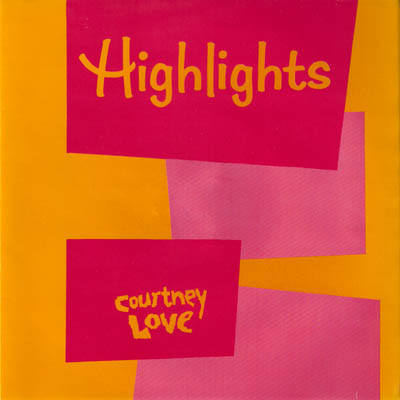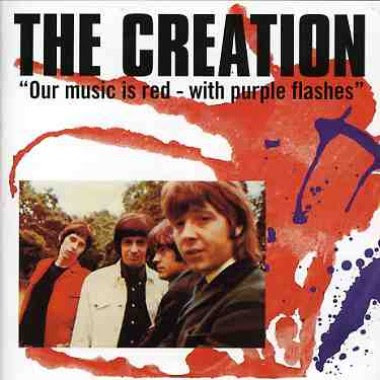
The wonderful Lois Maffeo has made a number of great records, and some of the best were the singles that she made under the name Courtney Love. As a gag it's not bad as Maffeo's gentle acoustic pop songs are about as far away from the real Love's aggressive antagonism. Maffeo's work has always followed a simple template, lovely ramshackle 2 minute indie-pop songs based around her warm voice and jauntily strummed guitar. It's all endearingly amateurish-sounding (although having seen her play a couple of times, it was clear that it took a lot of skill to sound this off-hand) and the Courtney Love singles are great. Lead song from the 'Hey! Antoinette' 7" (1991) is a wonderful little indie-world dissection and of the other two songs 'My Last Night' is a charm. The 'Highlights' 7" has three more great songs, the lead being particularly good and 'Shaniko' a close second.


The mighty Don Covay seems to have been relegated to a soul also-ran these days, which is a total mystery considering the blistering early output by Covay and his band. Their first three albums are superb pieces of raw and direct soul and R&B of the like that was rare at the time and rarer since. The 2007 compilation Platinum Collection covers strictly that early part of Covay's career (1964-1969) and highlights just what remarkable stuff he was putting out. What is particularly extraordinary about his work is that the kind of blues based R&B and soul that Covay specialised in was being recorded in a lush, string-laden style, particularly by Covay's label Atlantic, but there's none of that here. This is Covay and his band blasting out this fantastic stuff with no messing about, it's completely direct and, with the exception of the occasional appearance of a brass section, it's just what it is. In some ways it's therefore no surprise that Covay worked, and often wrote, with Steve Cropper who was a fan of this unfussy way of recording and playing. There are, of course, a handful of dud tunes (and Covay lost his way dreadfully in the 70's), but that's just the nature of the catch-all approach that everybody took at the time, and in fact the uncommonly high quality of not just the performances but the songs is another reason to give the early Covay records much more in the way of props than they get.

Next up is the folk curio of Julie Covington's eponymous album from 1978. Covington had done some work on the folk circuit but by 1978 she was known for her work in musical theatre and it seems strange that the album was made at all, let alone in the way it was. The calibre of the people involved in the album is astonishingly high, with Richard Thompson, John Cale, Trevor Lucas, Steve Winwood, Simon Nicol, Andy Fairweather-Low and Chris Spedding playing on it, and Joe Boyd producing. What's surprising then is how mediocre the record is. The opening cover of Richard & Linda Thompson's 'I Want to See the Bright Lights' is lovely, but it's followed by a weirdly inappropriately upbeat version of Sandy Denny's 'By the Time It Gets Dark' (and as we've already seen, nobody should try and cover Sandy) and a gratingly theatrical 'Sip the Wine'. It's a shame because the song choices are diverse and on the whole great (everything from Kate Bush to the McGarrigle sisters by way of Lennon) and the musicians should have guaranteed quality. I think unfortunately it's just that Covington herself is sadly inherently a bit naff.

The breakthrough album for the Cowboy Junkies (at least breaking through into the notice of some indie kids) was their second, The Trinity Session (1988). Recorded in one night with the absolute minimum of instrumental complexity, it's a crepuscular drift through an early Americana take on country rock. Skeletal, sepulchral and morphine slow it's a thoroughly arresting example of how less can be so much more. Margo Timmins' voice is quietly stunning and indeed it's the hushed tone of the whole band that makes the whole thing so captivating - you keep wanting to turn it up to hear just how it was possible to make such a quiet noise. It's a confident mix of covers and original songs, and amongst the covers are the notorious version of the Lou Reed's 'Sweet Jane' and Patsy Cline's 'Walkin After Midnight' (which is transformed into a totally desolate country blues), but in many ways its the muscle flexing originals that are most diverting.

Cranes were a kind of post-Cocteau Twins ethereal dream-indie outfit who vehemently refuted any attempts to call them goths. They were goths though really. I always found them a bit difficult to like, mainly due to singer Alison Shaw's peculiarly high childish voice, but their 'Tomorrow's Tears' EP I really liked, and still do. The lead song is a quiet, slow, delicately phrased tune with a repeated piano motif and a sort of lullabyish feel to it. The other three songs are a bit truer to their standard output, dark, gothic indie-rock with a heavy emphasis on repetition and percussion, but nonetheless 'Casa Blanca' is a great song.
Anarcho-punks Crass knocked out a couple of typically aggressive albums before surprising the hardcore punk crowd with the release of 1981's Penis Envy. The vocal and lyric writing duties had passed to Eve Libertine and as a result the macho front gave way to an entirely different take on the role of politics in punk. Penis Envy is a great punk album, and one of the few British punk albums that actually uses the form to discuss politics in a serious and committed way. What also came with this new approach was a determination to add a valuable musical dimension and the previous banging about with a handful of chords and four-four rhythms is replaced with a marked increase in musical complexity. That's not to say that this is some kind of prog-punk, but it is certainly engaged with the whole process of actually bothering to make an effort to make a whole song mean something rather than just being a messy post-pub rock musical backing to someone shouting (there's even a nascent Stereolabishness to 'Health Surface'). It's not an easy record to love (it's not exactly a great record) but it is an honourable one, and bearing in mind they were very few and far between in the UK punk scene, I think it's worth its weight in gold.

Our Music Is Red - With Purple Flashes (1998) is a compilation of all the 7" A and B-sides that the Creation released in their short-lived career from 1966-1968, together with six other rarities from the time. It's interesting to note how much they crammed into their two years, stylistically speaking. They had a go at everything contemporary, with a remarkably high level of success. So we've got original songs in the mode of the Who, the Rolling Stones, the Kinks, etc, and there's a nice dose of psychedelia thrown into the mix for good measure. It's all great, highly stylised 60's fare and it's pleasingly at the rough end of performance - the Creation had a good deal more in common with the Kinks in that respect than sops like the Beatles.

No comments:
Post a Comment